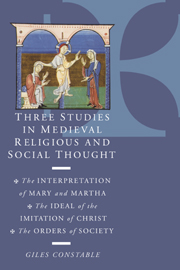 Three Studies in Medieval Religious and Social Thought
Three Studies in Medieval Religious and Social Thought Book contents
- Frontmatter
- Contents
- List of illustrations
- Preface
- List of abbreviations
- I THE INTERPRETATION OF MARY AND MARTHA
- II THE IDEAL OF THE IMITATION OF CHRIST
- III THE ORDERS OF SOCIETY
- Introduction
- The early Middle Ages
- The eleventh and twelfth centuries
- From the twelfth century to the end of the Middle Ages
- Appendix: mediocres (mediani, medii) in the Middle Ages
- Bibliography of secondary works
- Index of manuscripts
- Biblical index
- General index
The eleventh and twelfth centuries
Published online by Cambridge University Press: 08 December 2009
- Frontmatter
- Contents
- List of illustrations
- Preface
- List of abbreviations
- I THE INTERPRETATION OF MARY AND MARTHA
- II THE IDEAL OF THE IMITATION OF CHRIST
- III THE ORDERS OF SOCIETY
- Introduction
- The early Middle Ages
- The eleventh and twelfth centuries
- From the twelfth century to the end of the Middle Ages
- Appendix: mediocres (mediani, medii) in the Middle Ages
- Bibliography of secondary works
- Index of manuscripts
- Biblical index
- General index
Summary
THE VARIETY OF DIVISIONS
no single system of social orders prevailed in the eleventh and twelfth centuries, when there were any number of different, and frequently overlapping, schema for dividing people into two, three, four, or sometimes more, categories. This section will concentrate on the variety of social orders and the richness of the imagery applied to them at that time, leaving the study of the continued importance of the traditional tripartite patterns to the following section. This means leaving the main road in order to investigate the byways, but the detour may help put the larger picture into perspective. No strict division of the material is possible, however, and different systems appear in the works of the same writer, who may therefore appear in both sections.
The revival of interest in Antiquity, especially Calcidius's translation of the Timaeus, where Plato divided society into priests, labourers, and soldiers, and in the Celestial hierarchy and Ecclesiastical hierarchy of Denis the pseudo-Areopagite, introduced various ancient schemes of social order into western thought. Calcidius equated Plato's divisions with the highest, middle, and lowest and these in turn with heavenly, angelic, and earthly; wise men, military men, and common men; the head, chest, and lower parts; and reason, energy (vigor), and desire. The medieval commentators (including Thomas Aquinas) were attracted by the model of the city-state and saw the divisions as powerful men, honest citizens, and tradesmen – sometimes typified by tailors – as the upper, middle, and lower (suburbs) parts of a town, and as greater men, soldiers, and saddle-makers.
- Type
- Chapter
- Information
- Three Studies in Medieval Religious and Social ThoughtThe Interpretation of Mary and Martha, the Ideal of the Imitation of Christ, the Orders of Society, pp. 289 - 323Publisher: Cambridge University PressPrint publication year: 1995


